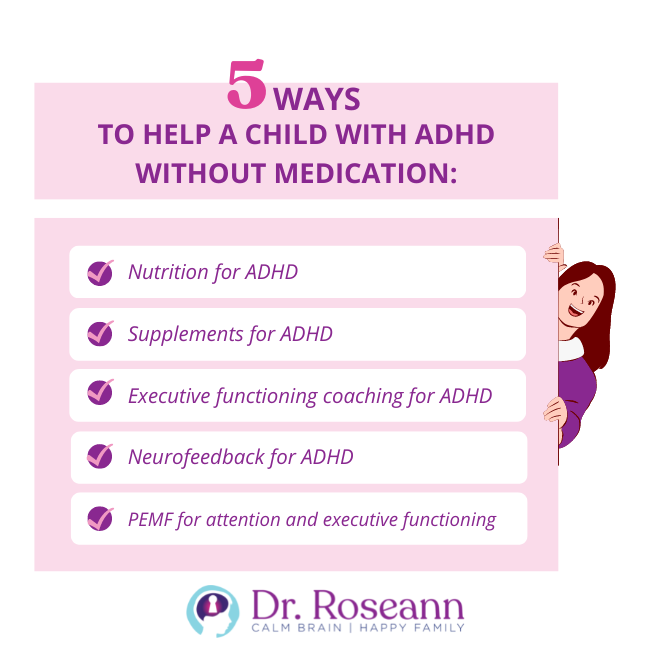When You Have No Patience for Your ADHD Child: Real Strategies & Support

Key points
- Constant Vigilance: You're always "on," anticipating the next impulsive action or helping them stay on task.
- Emotional Dysregulation: Your child's big emotions can trigger your own, leading to a cycle of frustration and anger.
- Social and Academic Worries: You may feel embarrassed by public meltdowns or stressed about school performance and social interactions.
- The Feeling of Being Ignored: It can be deeply frustrating when your child doesn't seem to listen, even though it's often a symptom of their inattention.
If you just typed "I have no patience for my ADHD child" into a search bar, take a deep breath. You've landed in a safe space. That feeling of being at the end of your rope is not a sign that you're a bad parent; it's a sign that you're a human parent navigating the uniquely exhausting and often relentless challenges of raising a child with Attention-Deficit/Hyperactivity Disorder (ADHD).
You are not alone. The constant redirection, the emotional outbursts, the seemingly simple tasks that turn into hour-long battles—it's enough to test the patience of a saint. This guide is here to offer you validation, understanding, and most importantly, practical strategies to help you move from a place of frustration to one of connection and confidence.
Why Is Parenting a Child with ADHD So Challenging?
Understanding the root of the struggle is the first step toward finding patience. Parenting a child with ADHD is uniquely demanding because their brains are wired differently. According to Nemours KidsHealth, the skills that control attention, behavior, and activity don't come naturally to them. This isn't a choice or an act of defiance; it's a neurodevelopmental reality.
This reality creates a perfect storm for parental burnout. A 2018 study highlights that caregivers of children with ADHD face increased stress, family conflict, and profound physical and emotional exhaustion.
Common Parental Pain Points:
- Constant Vigilance: You're always "on," anticipating the next impulsive action or helping them stay on task.
- Emotional Dysregulation: Your child's big emotions can trigger your own, leading to a cycle of frustration and anger.
- Social and Academic Worries: You may feel embarrassed by public meltdowns or stressed about school performance and social interactions.
- The Feeling of Being Ignored: It can be deeply frustrating when your child doesn't seem to listen, even though it's often a symptom of their inattention.
 Image from Evolve Psychiatry, illustrating the importance of connection.
Image from Evolve Psychiatry, illustrating the importance of connection.
Shifting Your Perspective: Understanding the "Why"
Patience begins with empathy, and empathy begins with understanding. Before you can change your child's behavior, it's helpful to change how you view it.
It's Not Willful Defiance, It's Brain-Based
One of the most powerful mindset shifts is realizing that ADHD behaviors are not a reflection of your child's character or your parenting. As ADDitude Magazine experts often state, it's crucial to never punish a child for behavior outside their control. Their impulsivity, inattention, and hyperactivity are symptoms, not moral failings.
Is It ADHD or Something More? Differentiating Comorbid Conditions
Sometimes, persistent defiance can be a sign of a co-occurring condition. The most common is Oppositional Defiant Disorder (ODD), affecting up to 60% of children with ADHD. Differentiating them is key to effective intervention.
| Feature | ADHD | ODD |
|---|---|---|
| Primary Motivation | Behavior is often unintentional, stemming from poor impulse control, inattention, or hyperactivity. | Behavior is intentional, driven by a need to challenge authority, argue, and defy rules. |
| Core Symptoms | Inattention, disorganization, impulsivity, fidgeting. | Anger, irritability, argumentativeness, vindictiveness. |
| Reaction to Rules | May forget or get distracted from following rules. | Actively and deliberately refuses to comply with rules and requests from authority figures. |
If your child’s behavior feels consistently hostile and intentionally defiant, it's essential to seek a professional evaluation to get an accurate diagnosis.
The Compounding Challenge: When the Parent is also Neurodivergent
For parents who have ADHD or are otherwise neurodivergent, the challenge can be magnified. Your own struggles with executive function, emotional regulation, or sensory sensitivities can make it harder to provide the consistency and calm your child needs. This can lead to a more rapid depletion of your patience reserves. However, it can also be a superpower, giving you a profound, intuitive empathy for your child's experience. Acknowledging this dynamic is crucial for self-compassion.
Practical Strategies to Reclaim Your Patience
Patience isn't something you either have or you don't—it's a skill you can cultivate. Here are actionable strategies to use when you feel your frustration rising.
1. Manage Your Own Emotions First
You cannot calm your child's storm if you're stuck in your own. Your emotional state directly impacts theirs.
- Acknowledge Your Feelings Without Guilt: It's okay to feel angry, exhausted, or overwhelmed. As experts at Pacific Neuropsychiatric Specialists advise, simply recognizing these feelings is the first step to managing them.
- Practice the Power of the Pause: When you feel your anger rising, stop. Take a short break. Use a grounding technique like box breathing: inhale for 4 seconds, hold for 4, exhale for 4, and hold for 4.
- Identify Your Triggers: Are you most impatient when you're tired, hungry, or rushed? Recognizing your triggers helps you prepare for and manage high-stress moments.
2. Shift Your Parenting Approach
Traditional discipline often fails with ADHD kids. A more effective approach is built on connection, structure, and positive reinforcement.
- Create Rock-Solid Routines: Children with ADHD thrive on predictability. A consistent daily structure for mornings, homework, and bedtime reduces chaos and power struggles. Use visual charts so your child knows what to expect.
- Focus on Positive Reinforcement: Studies show that children with ADHD respond far better to praise and rewards than to punishment. Catch them being good and praise their effort, not just the outcome. Celebrate small wins to build their self-esteem.
- Use the 10-3 Rule: For tasks like homework or chores, try the 10-3 rule. Work for 10 minutes, then take a 3-minute break. This makes daunting tasks feel more manageable and helps maintain focus.
 Visual schedules can be a game-changer for kids with ADHD. Image Source: Dr. Roseann Capanna-Hodge
Visual schedules can be a game-changer for kids with ADHD. Image Source: Dr. Roseann Capanna-Hodge
3. How to Repair and Reconnect After You've Lost Your Cool
Every parent has moments they regret. What matters most is what you do next. Repairing the connection is a powerful tool for building a resilient relationship.
- Offer a Sincere Apology: Once you're calm, go to your child. Own your part without making excuses. A simple, "I'm sorry I yelled. I was feeling very frustrated, but it wasn't the right way to handle it," models accountability and reinforces their sense of security.
- Reconnect Physically and Emotionally: Spend a few minutes of dedicated one-on-one time doing something your child enjoys. A quick game, a shared story, or just a hug can bridge the emotional distance and reaffirm your love.
Building Your Essential Support System
You cannot and should not do this alone. A strong support system is not a luxury; it's a necessity.
Collaborate with Professionals
- Your Child's School: Work closely with teachers to develop an Individualized Education Plan (IEP) or 504 Plan. Accommodations like preferential seating, extra time on tests, or movement breaks can drastically reduce stress at home.
- Healthcare Providers: A team approach is best. This may include a pediatrician, a therapist or counselor, and an ADHD coach. The American Academy of Pediatrics (AAP) recommends behavioral therapy as the first-line treatment for ADHD in children, often before medication.
Find Your Community
- Support Groups: Connecting with other parents of children with ADHD is invaluable. They get it in a way no one else can. Organizations like CHADD (Children and Adults with Attention-Deficit/Hyperactivity Disorder) offer local and online support groups.
- Lean on Family and Friends: Be specific about what you need. Instead of saying "I'm so stressed," try "Could you watch the kids for an hour on Saturday so I can go for a walk?"
Prioritize Your Own Well-being
Self-care is the fuel that powers your patience. As MedicalNewsToday emphasizes, taking care of your own physical and mental health is critical.
- Schedule "Off" Time: Even 15 minutes a day to read, listen to music, or just sit in silence can help you recharge.
- Nourish Your Body: A healthy diet, regular exercise, and adequate sleep are foundational for emotional regulation.
- Seek Your Own Support: If you feel consistently overwhelmed, depressed, or anxious, consider seeking therapy for yourself. A therapist can provide you with coping strategies to manage the unique stressors of parenting a child with ADHD.
Parenting a child with ADHD is a marathon, not a sprint. There will be frustrating days. But by shifting your perspective, implementing brain-friendly strategies, and building a robust support system, you can cultivate the patience you need. Remember to offer yourself the same grace and compassion you are working so hard to give your child.
References
- Centers for Disease Control and Prevention. (n.d.). Data and Statistics About ADHD. https://www.cdc.gov/ncbddd/adhd/data.html
- Cussen, A., Sciberras, E., & Ukoumunne, O. C. (2018). A systematic review of the impact of parental and family factors on child and adolescent ADHD symptoms. Journal of Attention Disorders, 22(4), 315-330. https://www.ncbi.nlm.nih.gov/pmc/articles/PMC5881233/
- Nemours KidsHealth. (n.d.). Parenting a Child With ADHD. https://kidshealth.org/en/parents/parenting-kid-adhd.html
- CHADD. (n.d.). For Parents. https://chadd.org/for-parents/overview/
- West, M. (2023, June 28). Losing patience with a child with ADHD: Coping strategies and tips. MedicalNewsToday. https://www.medicalnewstoday.com/articles/i-have-no-patience-for-my-adhd-child

About the author
Aisha Khan, MD, is a board-certified pediatrician with a focus on adolescent medicine and developmental disorders. She runs a private practice in Austin, Texas, and is a vocal advocate for child mental health services.